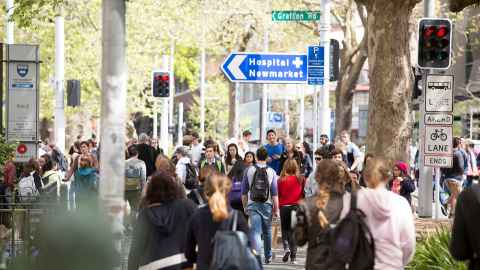Probability and applications research
Randomness surrounds us, from the motion and collisions of atoms to the arrival of cars at an intersection. Our research seeks to understand this randomness.

Probability includes both the theory and application of complex models motivated by other areas of mathematics and statistics, as well as physics, biology, finance and many other applied fields.
Stochastic processes
Probability research often involves studying the stochastic process of a system evolving randomly over time. Researchers can consider how changes to the system affect long term behaviour. For example, in modelling the spread of infectious disease, what methods must we use to reduce transmission rates (eg. vaccination or quarantine) and stop a large scale epidemic? Our research in branching processes aims to develop theories and techniques for answering such questions.
Probability theory
Many complex real-world systems have similar global features, even when their fine details are different. For instance, random networks in everyday life, from the World Wide Web, to social media networks, to power distribution grids, share a surprising “small-world” property. Probability theory shows how randomness can explain the commonalities between these apparently different examples.
Applied probability and stochastic operations research
Our research in applied probability includes optimising systems for performance where there is inherent randomness, also known as stochastic operations research. Examples include minimising waiting times in queues for hospital treatments, maintaining the reliability of telecommunication networks, or managing water flow for hydro-electricity.
Our researchers
Dr Azam Asanjarani
- Applied probability
- Queueing theory
- Markov decision processes
Professor Rachel Fewster
- Stochastic process models in ecology and population genetics
Dr Ciprian Giurcaneanu
- Information-theoretic methods for time series
Dr Jesse Goodman
- Probability theory
- Scaling limits
- Random graphs
Associate Professor Simon Harris
- Probability theory
- Brownian motion
- Branching processes
Professor Thomas Lumley
- Transit modelling
Dr Geoffrey Pritchard
- Stochastic operations research
- Applications in electricity markets
Associate Professor Ilze Ziedins
- Stochastic queueing networks
- Routing problems
- Markov decision processes